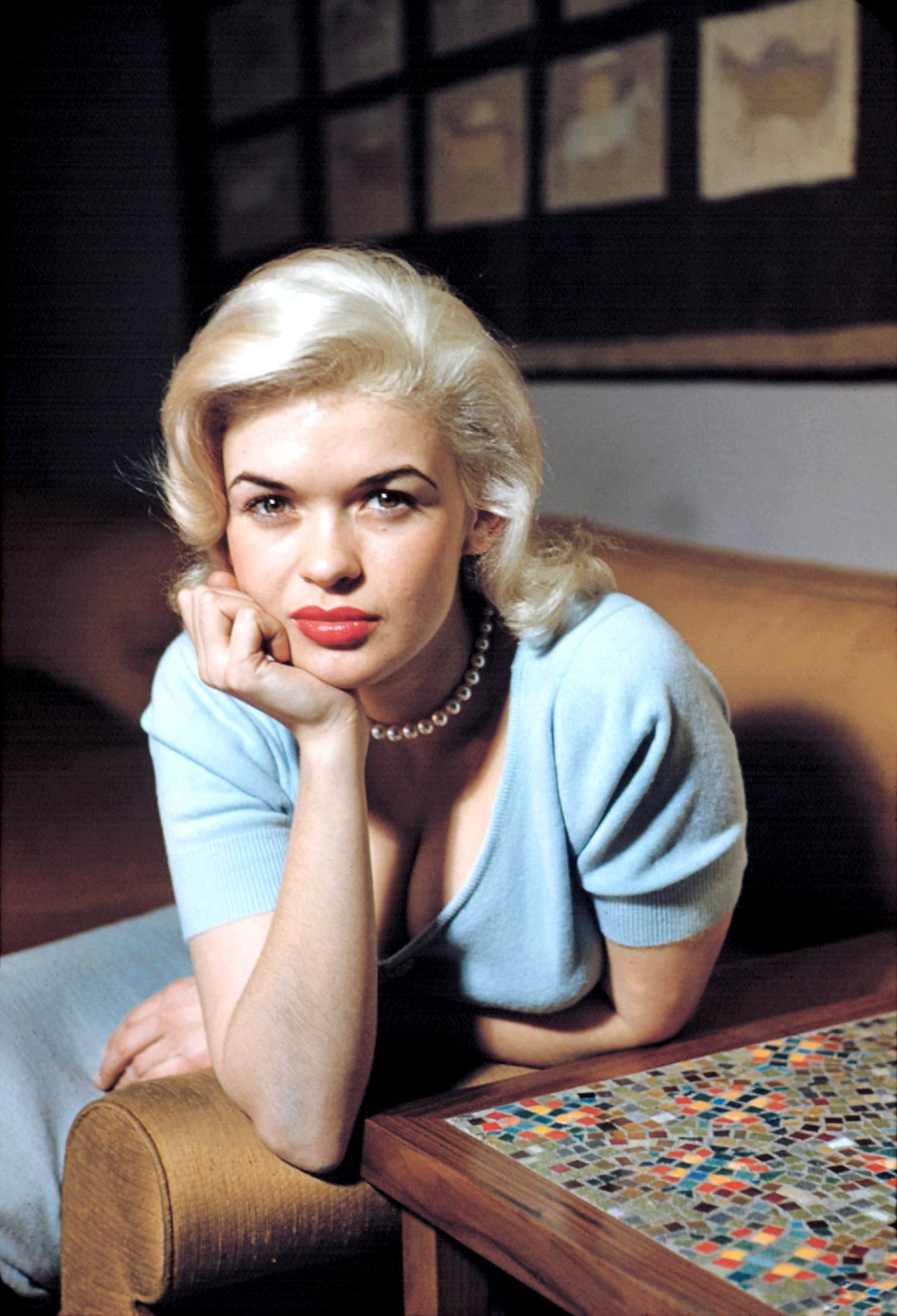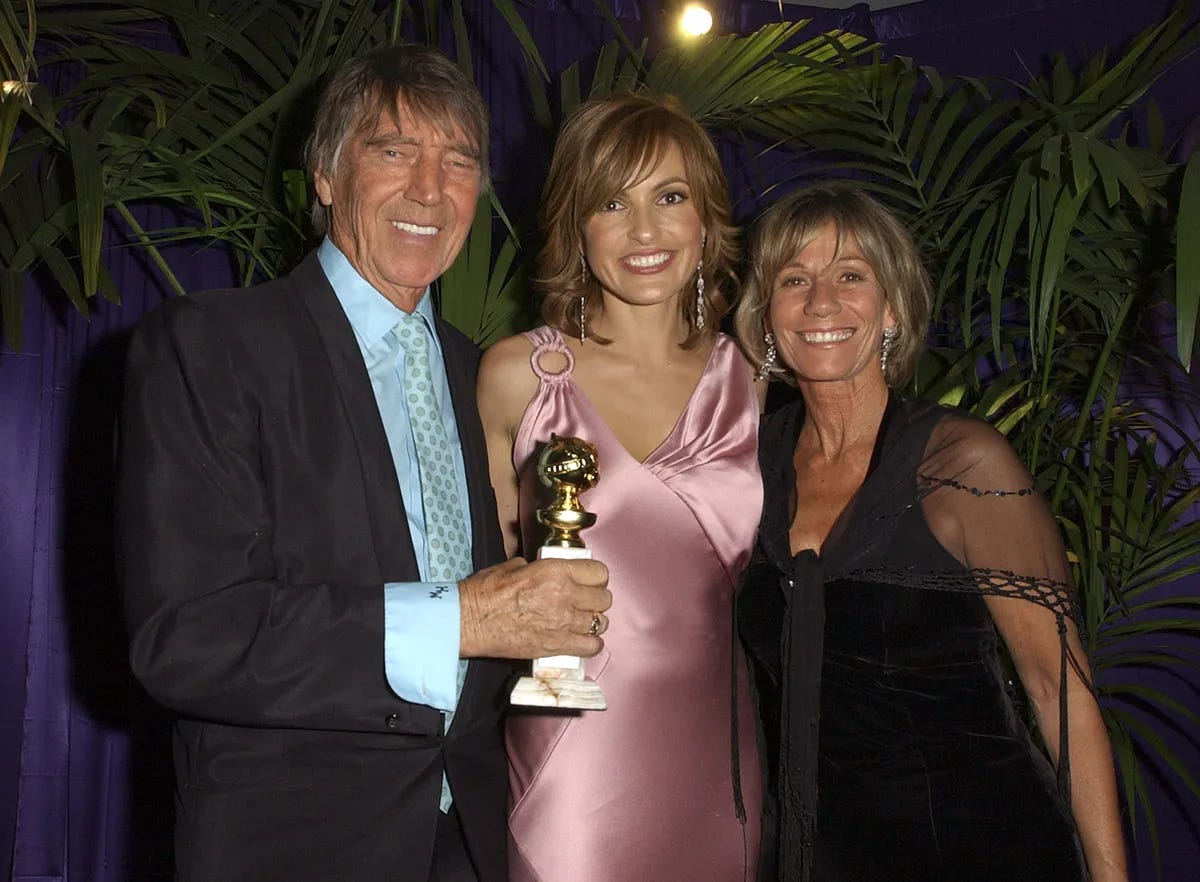Like most people who would ever seek this film out and watch the entire thing, I watched this for Arnold Schwarzenegger. I think this is the only TV movie he ever did, and one of the only times he’s played another known famous person. The other famous person was a cameo voice role on the PBS cartoon “Liberty’s Kids,” where he played Friedrich Wilhelm von Steuben. This fact is just funny to me, because Arnold is so singular there’s not many other people he could play.
But here, it makes sense, because he’s playing Hungarian-American bodybuilder, Mickey Hargitay. And if that name sounds familiar, that’s right, this film is about the parents of “Law & Order: SVU” star, Mariska Hargitay. Honestly, this film is a fucking wild watch with the context of this is how Mariska came to be. She would have been 16 when this aired.
Because watching this without that context, where this is just a pure TV movie biography of Jayne Mansfield, it turns out this is just not that interesting. The film portrays her as what she sadly was, a second-rate Marilyn Monroe.
Now, if you did a modern take on Mansfield, which Gus Van Sant and Catherine Hardwicke each considered doing at some point, you would make this a feminist deconstruction. Look at how women are forced to dumb themselves down, change who they fundamentally are, be sexually open, but not too open. All of this to appeal to the patriarchy running the world, and the entertainment business.
Mansfield wanted to be the next Marilyn, so she adopted her hair and affected the high-pitched, squeaky “sexy baby” voice. She knew completely how to play the game, and aware of what part she was playing the whole time. She wanted to be successful, to be famous, and also care for her daughter.
Mansfield knew to be famous, she had to draw attention to herself. She knew she had to sell her sexual appeal to do that, and that’s what she did.
But the film itself is never interrogative about anything that I’ve mentioned. Another character never calls Jayne out on her vocal-changes, or why she’s doing anything the way she’s doing it. Certainly not in the way they would nowadays with a feminist lens. This is just a straight depiction.
It can be kind of offensive in that depiction as well, as the film kind of portrays her as losing control, and being pretty oblivious to her family, to the point of abuse. It even goes out of its way to sex-shame Mansfield a few times.
It’s typical beats of a rise and fall story, where during the fall the star finds themselves in seedy places or doing seedy things. But it seems kind of weird in this case to be openly morally against what your subject was popularly known for? It’s so weird, though not entirely surprising.
It’s also weird the film does all of this with network TV production values and censorship standards. That’s, you know, limiting, when you can’t really get into the sex-forward way Mansfield put herself out there. Here, they can’t show anything but a dress strap pop off. They can only briefly suggest Mansfield openly traded sexual favors, to get ahead in the business.
Speaking of that network TV production value, the acting is pretty rough of course. Arnold’s the highlight, but this is still during the period where he was pretty stiff acting in English, his second-language. They even have him toss a few guys for good measure, since he was just seen as a strongman.
As always though, even though Arnold’s acting isn’t great, he’s still a magnetic personality. It’s also funny that he serves as the narrating framing device of the movie, telling Jayne’s entire life story to a writer after her death.
As for Loni Anderson as Jayne herself, I don’t think I’ve ever seen her in anything else, since I never saw “WKRP in Cincinnati,” but she’s really not good here. She’s fine in the first half, but she can’t rise up to portraying the more troubled parts later on, when Jayne is drinking heavily, and not taking the state of her career well.
What’s sad about Mansfield’s story in real-life is that she basically sold her soul for nothing. She outlived Monroe by a few years, but never achieved any success beyond being a slightly more scandalous version of Marilyn, complete with forced “wardrobe malfunctions.”
Mansfield starred in a few films, but none of them are as well-remembered as Monroe’s films. She never did any “serious” work. She’s never had a filmed depiction, besides this film. Unlike what Arnold narrates at the end of this film, Jayne isn’t really remembered at all today.
Jayne Mansfield will now forever just be Mariska Hargitay’s mother. A mother that Mariska has no memory of, as she died when Mariska was only three years old. Mariska was in the backseat during the car accident, with her brothers Miklós and Zoltán. They all escaped with minor injuries, while the adults in the front of the car were killed.
Afterwards, they went to live with their father Mickey Hargitay, and his new wife Ellen, who then raised the children. Mariska seems to have had a good relationship with her family, her step-mother, and her half-siblings, including Jayne Marie Mansfield, her mother’s first child.
In 2004, Mariska said that the death of her mother left:
“a hole in my life that won't ever be filled. I will never get over it. I will always be a girl who lost her mom.”
Thankfully, Mariska seems to have been raised by good parents.
1.5/5 Stars
⭐️✨
By the way, I watched the full 2-hour version on YouTube, that includes all the commercials from the original broadcast on October 29th, 1980, for WJBK, which was Detroit, Michigan’s CBS affiliate until 1994, when it switched over to Fox.
Like with my experience in watching the 1997 “The Shining” miniseries’ original broadcast, the commercials were far and away the most entertaining part of the whole experience.
The Shining Miniseries (1997) Review
“The Shining” is perhaps my favorite horror movie ever made, and as such I’ve been wanting to watch the 1997 miniseries out of curiosity as long as I can remember. Since the viewing experience watching this was for a full six hours, I took extensive notes. So let's dissect this thing.
It turns out the early 80s really were something. Stuff that stood out to me included:
As soon as the broadcast starts, the local news teases that at 11, they have a story about a dead baby found in a dumpster. Which, why the fuck would you ever tease that story out, to make people watch the news that night?
Also among the teased news stories were the ongoing Iranian hostage crisis, day 361 of the eventual 444, as well as Ronald Reagan and Jimmy Carter getting back on the campaign trail after the previous night’s debates.
Since it was election season, there’s also political ads saying that the Democrats are out of gas, and that the dollar was worth less during the time they were in charge. These were knocks on the 1979 gas crisis, and the “stagflation,” which was a new and ever-present trouble of the era. “Vote Republican. For a change.”
There was also an extended Reagan campaign ad that positioned him as “a man who believes that the decline must be halted, and can be halted.” Reagan even goes into a several step plan in combating inflation. Spoiler alert, it mostly involves cutting government spending.
There were no commercials from Democrats, perhaps one of the many reasons they were blown-out in the election a week later.
The movie trailers were for “The Stunt Man,” and “The Awakening.”
There’s an Aunt Jemima commercial where a door to door salesman is trying to sell the pancake mix with little luck, so he resorts to shoving the pancake in people’s mouths when they open the door. Somehow, this works in his favor, and he does not get arrested for pancake assault.
McDonalds introducing their brand new “great McChicken sandwich, at a great McDonalds price.” Weirdly enough though, they never say what the price is. Maybe that’s why the sandwich was a failure initially. Quoting from Wikipedia:
“The sandwich, originally introduced in 1980, proved to be a sales disappointment and was later replaced with the highly successful Chicken McNuggets.But following the success of McNuggets, the McChicken was reintroduced in 1988. But again, McDonald's removed the McChicken from its menus in the United States on September 26, 1996, and it was replaced with the Crispy Chicken Deluxe, which was part of McDonald's ill-fated Deluxe line of sandwiches. But once again, the McChicken was brought back gradually in the later months of 1997, due to overwhelming letters and petitions.”











